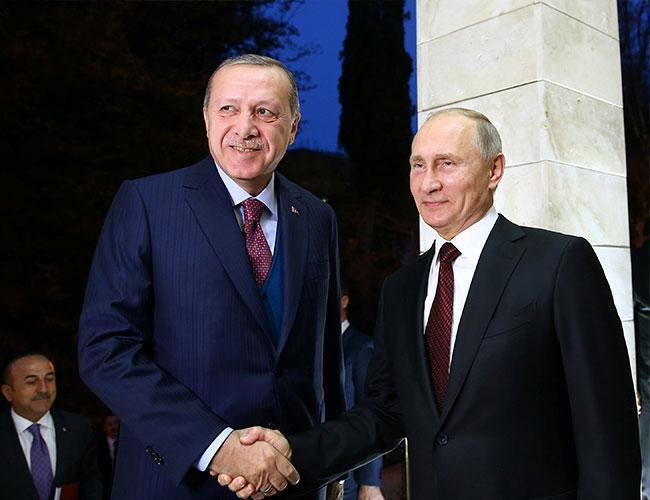
Turkey, Russia and Iran will hold a high-level summit in Sochi on Nov. 22 to discuss the situation in Syria’s Afrin and Idlib regions, President Recep Tayyip Erdoğan has said, reiterated Ankara’s opposition to the invitation of the People’s Protection Units (YPG) to any meeting on the future of Syria.
Erdoğan, Iranian President Hassan Rouhani and Russian President Vladimir Putin will come together almost a week after Erdoğan-Putin meeting in Sochi.
“We, as Turkey, Russia and Iran, want the continuation of the Astana Process. We’ll come together at the level of leaders on Nov 22. A day before us, our foreign ministers will hold preparatory talks. We will have the chance to review latest developments particularly in Afrin and Idlib,” Erdoğan told reporters on board his return flight from Qatar late on Nov. 15.
“I believe that this meeting will be very important,” he added.
The chiefs of general staff of the three countries will also come together in Sochi to discuss the military aspect of recent developments in Afrin and Idlib, Erdoğan stated.
Turkey, Russia and Iran agreed as part of the Astana Process to monitor ceasefire between Syrian regime and the armed opposition groups through the establishment of four de-escalation zones. Turkey and Russia were tasked to observe the ceasefire in Idlib, with the Turkish military working to maintain “observation spots” inside the rebel-held region.
“As you know, this issue of the establishment of 12 observation spots is a sensitive one. On these spots, we show flexibility towards the demands of Russia and even of Iran. But we don’t take into account Iran’s demands on Afrin. Because Russia made us promises about withdrawal from Afrin at the G20 Summit in Hamburg,” Erdoğan said.
He also noted that Russian officials hinted that they could tolerate potential moves from Turkey in response to “threats and provocations” from Afrin.
“We evaluate Afrin from this perspective. The protection of the demographic structure in Afrin is among our sensitivities,” he said.
Coordination between the Astana and Geneva processes
Erdoğan stressed that Ankara and Moscow agreed to maintain coordination between the Astana and Geneva processes aiming to resolve the Syrian war, reiterating Turkey’s stance against the YPG and the Democratic Union Party (PYD).
“There will be no concessions on that. We, Turkey, will never be at the table where terror organizations are also present. This is valid for both Geneva and Astana. If a terror organization is there, no one should expect our presence. In politics there is a question of honor and we will never give concessions on the honor of politics. I have told this to Putin,” he said.
‘Withdraw arms and let’s launch a political solution’
Regarding a deal between Putin and U.S. President Donald Trump - underlining the need to launch efforts for a “political solution,” Erdoğan repeated his call for a “complete withdrawal of all military assets” in Syria so negotiations can resume.
“We will do whatever is necessary for a political solution. The U.N. would also be involved. Let’s take these steps,” he said.
“But in fact I cannot currently see any of the things that they [Trump and Putin] referred to in their statement ... A political solution is good, but wasn’t there any way for such a solution in the last seven years? If yes, why has it not been pushed? Why have hundreds of thousands of people been killed?” he added.
US builds base in Raqqa
Responding to a question about a recent BBC report that revealed that the YPG recently struck a deal to allow heavily armed Islamic State of Iraq and the Levant (ISIL) militants to leave Raqqa, Erdoğan criticized the U.S. for “partnering with one terrorist organization in order to fight another terror group.”
“They say they are not physically there and are just staging aerial attacks and providing logistical support, but the reality is otherwise. American commandos and other security personnel are working actively together with the YPG in this region. There are rumors that they pay YPG elements,” he said.
The Turkish president also recalled that the U.S. provided heavy weapons and ammunition to the YPG in “more than 3,500 trucks,” while the U.S. also has 13 military basis inside Syria and is building another one in Raqqa.
“When this is the case, how convincing is it to say ‘I’m not involved in this, I’m just observing it’? The reality is there for all to see. It shows clearly that the U.S. has been involved in planning [the YPG’s] land operations,” Erdoğan said.
Putin not hopeful on Nagorno-Karabakh
On a question about his discussions with Putin on the decades-old Nagorno-Karabakh conflict between Azerbaijan and Armenia, Erdoğan said the Russian president is “not hopeful” about a resolution.
“We discussed all these things but we observed hopelessness in them,” he said.
S-400 missile purchase
Regarding Turkey’s controversial purchase of S-400 anti-ballistic missile systems from Russia, the Turkish president reiterated that initial agreements have been signed and work for providing the necessary credits has also been positively concluded.
“But we have found out that the stance of lower-level bureaucrats is different from [me and Putin]. We will be able to make important progress on Nov. 22 if our friends work more intensively now,” Erdoğan said.
‘Islam is Islam’
On the recent debate stirred after Saudi Crown Prince Mohammad bin Salman said his country would “adopt moderate Islam,” Erdoğan stressed that he has “always said there is no such thing as moderate or non-moderate Islam.”
“Islam is Islam. As I have said numerous times to Western leaders and non-governmental organizations in the U.S.: Do we use definitions like ‘moderate Christianity,’ or ‘non-moderate Christianity’? We don’t. Using such definitions for Islam and efforts to associate our religion with violence are wrong. That’s why we oppose against the use of such terms. The principles of Islam are clear. Islam is Islam,” he said.